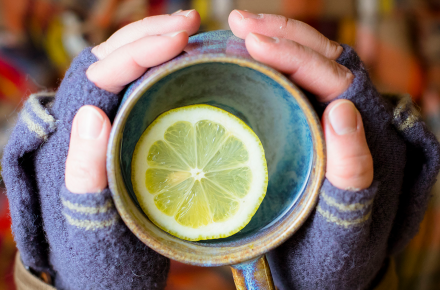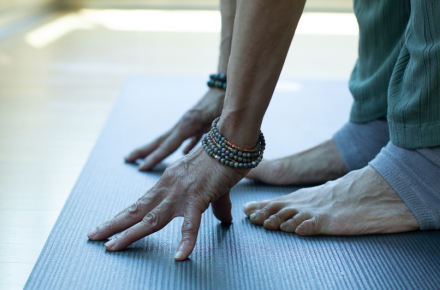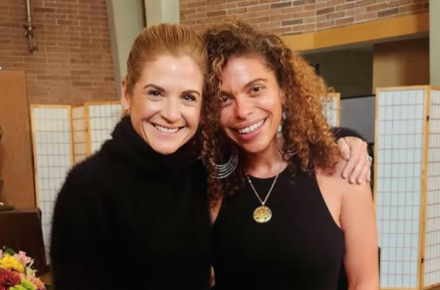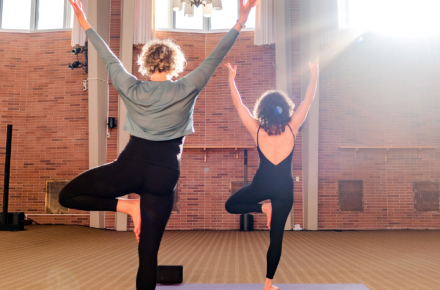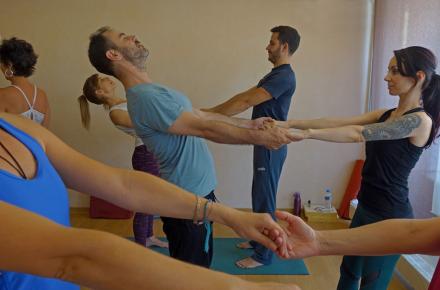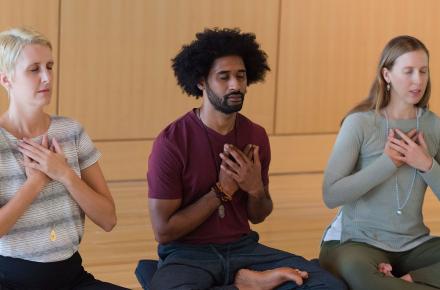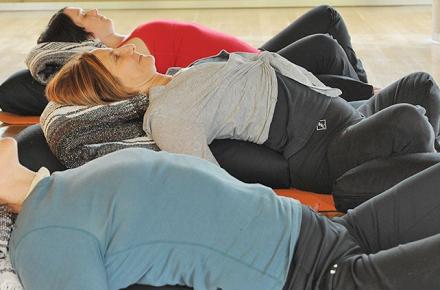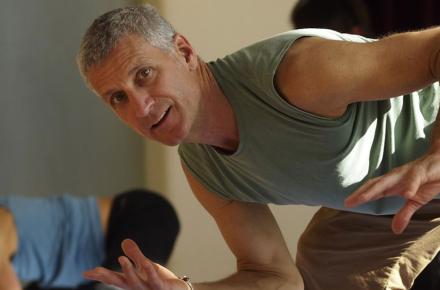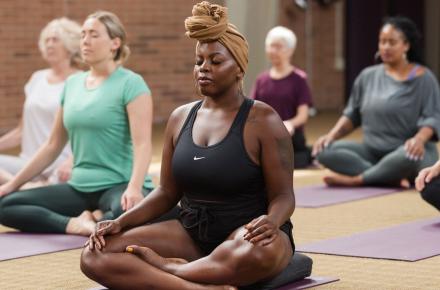Ayurvedic Self-Care Routines for the Whole Family
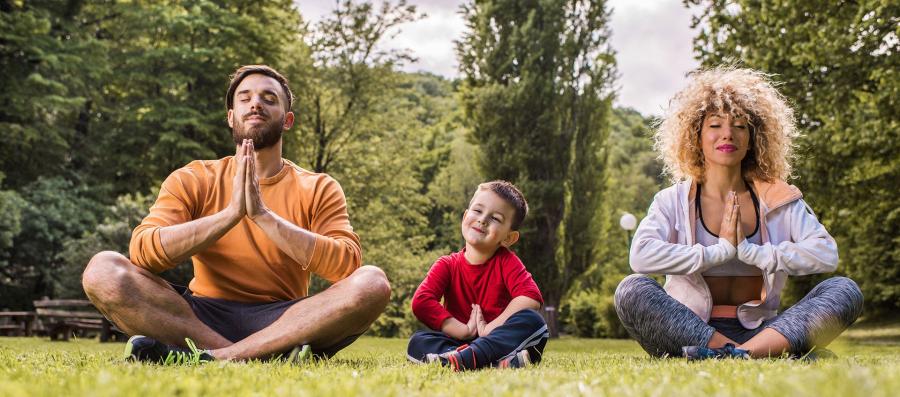
by Shannon Sexton
If you and your family feel like you’re running on fumes, you’re not alone. Every parent I know talks about their struggle to stay calm and centered, and to keep their kids calm and centered, in the midst of our modern-world madness. Even those of us who engage in contemplative practices and strive to live healthy lifestyles often struggle with high levels of stress. And we struggle to take care of ourselves.
But here’s an eye-opening fact: As parents, it’s surprisingly easy to underestimate the impact that our stress levels have on our kids. According to research by the American Psychological Association (APA), “over two-thirds of parents think their stress level has slight to no impact on their child’s stress level. However, only 14 percent of tweens and teens reported that they are not bothered when their parent is stressed.”
As an article on the APA website goes on to explain, “Children model their parents’ behaviors, including those related to managing stress. Parents who deal with stress in unhealthy ways risk passing those behaviors on to their children. Alternatively, parents who cope with stress in healthy ways can not only promote better adjustment and happiness for themselves, but also promote the formation of critically important habits and skills in children.”
Kripalu Yoga teacher and Ayurvedic practitioner Sarajean Rudman, who had her first child last year, has a suggestion for parents who want to shift their family’s relationship to stress: Make self-care a team effort for all. How? By designing a dinacharya practice that you can do together, every day.
What Is Dinacharya?
In the parlance of Ayurveda, dinacharya can be defined as “routines for health and well-being,” often practiced in the morning and at bedtime. At first glance, the traditional activities recommended for this practice may seem mundane. For example, in the morning: waking up early, drinking warm water, scraping your tongue and perhaps doing some other cleansing practices, stretching and meditating, and eating a nourishing breakfast. But when practiced over the long term, they can be profound.
As Sarajean explains, “Dinacharya is a way to ritualize taking care of yourself every day, so that self-care becomes sacred. When you create a dinacharya for your household, your family’s healthy, grounding self-care activities don’t get sacrificed at the altar of a busy schedule.”
How It Can Help You and Your Family
“Creating a family routine sets boundaries for everybody,” says Sarajean. “If you always have some sacred space in the morning and some sacred space at bedtime, then all of the chaos in the middle of your day can be digested more effectively—because there’s space on either end of your day to calm and nourish the body and mind.”
When you practice dinacharya first thing in the morning, for example, Sarajean says, “You’re telling your body and mind, ‘I love you, and I’m taking care of you today.’ That’s important for parents, because it’s so easy for us to give away all of our time and energy and think, ‘It’s okay, I’ll get back to myself later.’ But if you spend too long being stressed out and not taking care of yourself, eventually you will end up paying for it, whether that price becomes depression or anxiety, digestive problems, high cholesterol, or some other form of illness.”
Dinacharya is important for children, too, she says, because it sets them up for a lifetime of healthy habits and gives them healthy stress-management tools that they can use both now and in the future.
Doing some Ayurvedic rituals as a family also gives you time to bond and work together toward a common goal. “Suddenly, mornings aren’t about waking up so that daddy or mommy can exercise,” says Sarajean. “It’s about waking up as a family and saying, let’s do some practices that will help us be healthy together.”
Your Morning Family Ritual
Once you’ve discussed the concept of dinacharya with your family and decided to create a practice together, it can be helpful to start with a morning routine. Sarajean recommends the following Ayurvedic activities, in this order:
- Wake up together at the same time, ideally a bit earlier than usual so you don’t have to rush through your new rituals.
- Next, each person can drink a cup of warm water, which provides a gentle flush for the whole system while stimulating a cleansing bowel movement.
- Practice tongue scraping to remove ama, a subtle toxic residue, and cleanse the palate before breakfast.
- Do some yoga together to relax and lengthen the muscles while stimulating digestion and circulation.
- Ideally, sit together for a five- to 10-minute meditation or gratitude circle to quiet the mind, drop into the heart, and commune as a family.
- Eat a nourishing, home-cooked breakfast together. To save time, Sarajean suggests pre-cooking grounding, warming dishes, such as oatmeal, kitchari, or yogurt and baked fruit, on Sunday to last the entire week.
Your Family Bedtime Routine
A lot of parents say that bedtime can feel like a battle with their children, Sarajean observes. But Ayurveda offers creative ways to make bedtime “feel more celebratory, loving, and kind for everyone.”
Here’s a sample routine:
- Turn off all electronic devices.
- Sit down to an early family dinner, at least one and a half hours before sunset.
- After dinner, take a walk together to enjoy nature and stimulate melatonin production, which will make it easier for everyone to fall asleep.
- When you return home, everyone can do what Sarajean calls a sleep-promoting abhyanga (self-massage) practice, massaging their feet, hands, and top of the head with warm sesame oil in the colder months, and almond or coconut oil in the warmer months.
- If there is time, do a calming family activity together. As with your morning routine, you can tailor your Ayurvedic bedtime to your family’s particular interests and needs. For example, if your family is musical, try singing or chanting together for a few minutes. If you’re readers, have some special books to read at night.
Sweet dreams!
Browse Ayurveda programs at Kripalu.
Shannon Sexton is the former editor-in-chief of Yoga International magazine and a freelance writer, editor, and strategist based in Madrid.
© Kripalu Center for Yoga & Health. All rights reserved. To request permission to reprint, please email editor@kripalu.org.







